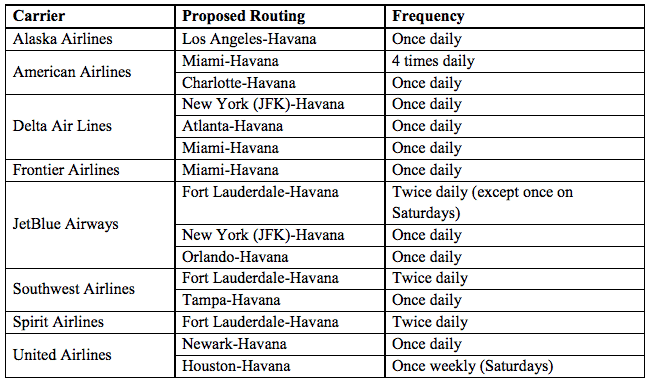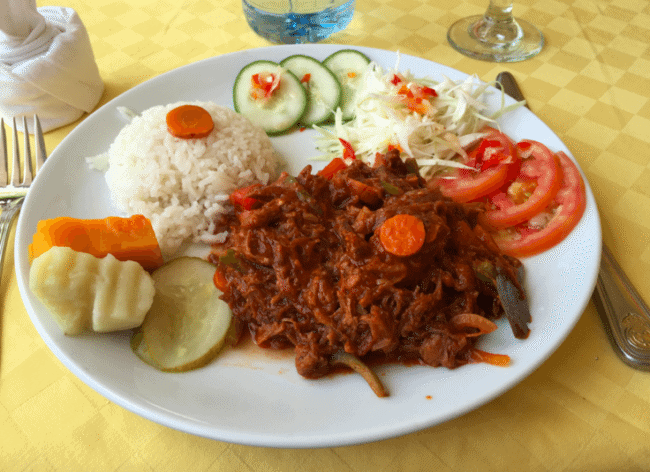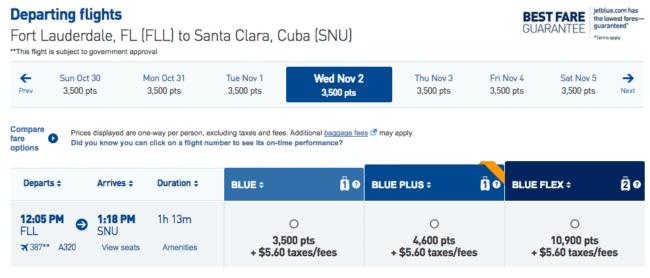MileValue is part of an affiliate sales network and receives compensation for sending traffic to partner sites, such as CreditCards.com. This compensation may impact how and where links appear on this site. This site does not include all financial companies or all available financial offers. Terms apply to American Express benefits and offers. Enrollment may be required for select American Express benefits and offers. Visit americanexpress.com to learn more.
Note: Some of the offers mentioned below may have changed or are no longer be available. You can view current offers here.
On August 31, 2016 the first regularly scheduled flight in over 50 years will take off from the United States headed to Cuba. The inaugural flight will be on JetBlue, and will depart from Fort Lauderdale and arrive to Santa Clara, Cuba.
You’ve probably seen a lot of information in the news over the last couple of years about the United States’ improving relationship with Cuba. I’m going to tell you about how these policy changes affect your ability to travel to the island nation.

What’s Up With Flights to Cuba
Back in June of this year the following six carriers were granted access to routes between the United States and Cuba’s nine other international airports aside from Havana:
- American Airlines
- Frontier
- JetBlue
- Silver Airways
- Southwest
- Sun Country
The Department of Transportation hasn’t 100% approved the carriers who will get access to direct Havana flights, but they have provisionally approved the following airlines:

Current Rules for Americans to Enter Cuba
It has never been illegal for Americans to travel to Cuba, but it was illegal to spend money there without prior approval, and a trip there would be considered de facto proof that you had spent money there.
In January of 2015, President Obama announced a loosening of travel restrictions. Instead of having to have the Treasury Department certify that you are in one of the 12 approved categories for spending money in Cuba (ie travel to Cuba), you can self-certify with no advanced proof required. From the State Department’s website:
The U.S. Department of the Treasury’s Office of Foreign Assets Control (OFAC) has issued general licenses within the 12 categories of authorized travel for many travel-related transactions to, from, or within Cuba that previously required a specific license (i.e., an application and a case-by-case determination)… No further permission from OFAC is required to engage in transactions covered by a general license.
The 12 categories are:
- family visits
- official business of the U.S. government, foreign governments, and certain intergovernmental organizations
- journalistic activity
- professional research and professional meetings
- educational activities
- religious activities
- public performances, clinics, workshops, athletic and other competitions, and exhibitions
- support for the Cuban people
- humanitarian projects
- activities of private foundations or research or educational institutes
- exportation, importation, or transmission of information or information materials
- certain authorized export transactions
You must pick a category, and while Scott was never asked to prove his category before, during, or after his trip in 2015, it’s probably a good idea to have some supporting evidence at hand.
In March of this year, days before his famous visit to Cuban soil, Obama once again loosened travel restrictions. You still must pick a category for yourself, that much has not changed. The policy that changed in March specifically concerns the “educational activities” category, and what is required/not required of you if you choose that category.

Prior to March, those that chose “educational activities” as their category had to travel with licensed American companies that led organized group tours. Now you don’t have to pay to join those often times expensive and inflexible guided tours.
If I choose “educational activities” as my category, what exactly is required of me now?
The New York Times reported that “travelers who fill their days with museum visits, cultural sightseeing and conversations with Cubans about their society, and keep a daily journal, could meet the requirements. American officials suggested that there would be little policing of the comings and goings of those making people-to-people trips.”
So the main condition for the “educational activities” category appears to be that you keep records of what you did while in Cuba for five years following the trip (and that those activities include productive interaction with the Cuban people and culture). You don’t have to submit anything following your visit to Cuba, just keep the records on hand in the case that they are requested.
For more detailed information about the 12 categories, read the US Department of the Treasury’s official statement.
Can I Use Miles to Get to Cuba?

You could always get to Cuba with miles this way, using rewards from a foreign program. What about now that American companies need not fear Uncle Sam (as much)?
There isn’t award space (or cash tickets, for that matter) available to Havana yet on any commercial flight between the United States and Cuba.
As for award space to Cuba’s other international airports aside from Havana:
- For the moment, you can’t see any award space on aa.com. The Points Guy has an informative post about how to book American Airlines award space over the phone (using American Airlines miles or British Airways Avios). It’s more time consuming using American Airlines miles as the company is American has more bureaucratic hoops to jump through, but it’s certainly doable. Using British Airways Avios looks to be even easier and is cheaper (4,500 Avios each way) since the distance between Miami and Cuba is short. American Airlines award prices to Cuba (Caribbean region) should be 15,000 miles each way in economy and 25,000 miles each way in Business Class (both of those are MileSAAver prices).
- JetBlue has flights priced in TrueBlue points on jetblue.com:

- Southwest doesn’t have any of their flights to Cuba available to search yet. When you type Cuba into either the Depart or Arrive search boxes, no results pop up.
Bottom Line
In a matter of hours, the first commercial flight since the embargo will fly from the United States to Cuba. From what I can see right now, the easiest way to get there with rewards is by redeeming JetBlue points. When are you going and how are you planning on getting there?
Scott went to Cuba in April 2015. Here is his series on the trip for those of you considering the journey (although consider this was written in 2015, so the policy described in this post is the most current):
- Entry, Exit, and Legal Requirements
- How to Book Flights or Ferries into or Out of Cuba
- Internet, Money, Food, Nightlife
- Transportation and Lodging
- Trip Report: Viñales


Chase Sapphire Preferred® Card
Just getting started in the world of points and miles? The Chase Sapphire Preferred is the best card for you to start with.
With a bonus of 60,000 points after $4,000 spend in the first 3 months, 5x points on travel booked through the Chase Travel℠ and 3x points on restaurants, streaming services, and online groceries (excluding Target, Walmart, and wholesale clubs), this card truly cannot be beat for getting started!
Editorial Disclaimer: The editorial content is not provided or commissioned by the credit card issuers. Opinions expressed here are the author’s alone, not those of the credit card issuers, and have not been reviewed, approved or otherwise endorsed by the credit card issuers.
The comments section below is not provided or commissioned by the bank advertiser. Responses have not been reviewed, approved, or otherwise endorsed by the bank advertiser. It is not the bank advertiser’s responsibility to ensure all questions are answered.


Do not travel to Cuba. It sounds like a great breakthrough in relations, but Cuba is a military dictatorship. “…since the Cuban military controls the tourism industry, things won’t get better for Cuban business owners and entrepreneurs, or everyday people. Every dollar, every euro that a tourist spends in Cuba goes straight into the pockets of the military junta that runs the place,” he [Carlos Eire] says. “The money does not trickle down.”
People working in hotels, restaurants, etc. pay 92% taxes, netting about $30/month.
Wait on going there, lobby for change, travel to countries that support human rights.
^^^ That’s why you stay in Casa’s, not the government run hotels, and deal directly with the people. It won’t change overnight, but make no mistake, your visit is hugely beneficial in the long run.